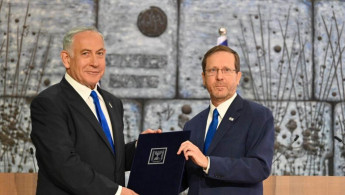Israel's former PM Netanyahu tapped to form next government
Israel's veteran ex-premier Benjamin Netanyahu secured a mandate Sunday to form a new government, paving the way for his comeback at the helm of what is expected to be the most right-wing administration in the country's history.
After a period of unprecedented political gridlock tested the electorate with five votes in less than four years, 1 November polls gave Netanyahu and his far-right allies a clear majority in the 120-seat parliament.
"I have decided to assign to you, Benjamin Netanyahu, the task of forming a government," President Isaac Herzog told him at a ceremony in Jerusalem, the city Israel in 1980 declared as its capital in its entirety, annexing Palestinian East Jerusalem in a move rejected internationally.
Accepting the mandate, the 73-year-old right-wing politician widely known as "Bibi" vowed to serve all Israelis, "those who voted for us and those who did not – it is my responsibility".
Netanyahu, who is fighting corruption allegations in court, will have at least 28 days to build a coalition with his allies – two ultra-Orthodox Jewish parties and a rising extreme-right alliance called Religious Zionism.
Herzog noted Netanyahu's ongoing trial: "I am not oblivious, of course, to the fact that there are ongoing legal proceedings against Mr Netanyahu at the Jerusalem District Court, and I do not trivialise this at all".
But he said that recent precedent made clear Netanyahu could serve as prime minister while contesting the allegations.
Netanyahu can seek a two-week extension to his initial mandate but is expected to announce a coalition deal reasonably quickly, given broad ideological unity within the incoming government.
Itamar Ben-Gvir and Bezalel Smotrich, co-leaders of the Religious Zionism bloc, have publicly demanded control of two key ministries – public security and defence – at the time of a heightened Israeli crackdown against Palestinians.
'Prophetise catastrophe'
Netanyahu's next moves will be closely scrutinised as unease mounts in some quarters over his policy plans and the goals of his controversial governing partners.
Netanyahu, however, insisted that those seeking to "prophetise catastrophe and scare the public" are misguided.
"It's not the first time we have heard this kind of talk," he said, making unspecific references to his own previous governments.
"It was wrong then and it is still wrong today."
The new government is however widely expected to pass sweeping judicial reforms, a long-held priority of Israel's right.
That could include a so-called "override clause" giving parliament the right to overrule the supreme court any time it declares legislation to be illegal.
Netanyahu's government may also take full control over appointing supreme court judges, a task currently performed by a panel of lawmakers, sitting judges and lawyers.
Suzie Navot, a constitutional law professor at the Israel Democracy Institute think tank, said "it is difficult for me to exaggerate the damage and danger" of the proposed reforms.
The centrist Yesh Atid party of outgoing Prime Minister Yair Lapid on Sunday condemned a "dark day for Israel's democracy," in an apparent reference to the judicial reform package.
Israel far-right politician Ben-Gvir 'worrying' for Netanyahu mandate, says Herzoghttps://t.co/1Swok0Wtz7
— The New Arab (@The_NewArab) November 10, 2022
Religious Zionism has also called for the main charge against Netanyahu – "breach of trust" – to be abolished.
Yesh Atid charged that the incoming government's goal was to "save Netanyahu from his trial".
'Very sensitive questions'
Ben-Gvir, a firebrand known for anti-Palestinian rhetoric and incendiary calls for Israel to annex the entire West Bank, has repeatedly called for the security services to use more force in countering Palestinian unrest.
Recent months have been the deadliest period in years in the Israeli-occupied West Bank according to the United Nations, with near-daily army raids.
Netanyahu's previous terms in office saw what little remained of the Middle East peace process collapse in a surge of Israeli settlement expansion in the occupied West Bank.
Herzog, whose role is largely symbolic, was reported to have tried to convince outgoing premier Lapid and his defence minister, Benny Gantz, to form a unity cabinet with Netanyahu, in order to keep Ben-Gvir from entering government.
The presidency publicly denied the claims.
Herzog this week told Ben-Gvir that as head of state he had received "questions from Israeli citizens and world leaders… very sensitive questions on human rights".
The president added: "There is a certain image of you and your party which seems – and I'll say it in all honesty – worrying in many regards."





 Follow the Middle East's top stories in English at The New Arab on Google News
Follow the Middle East's top stories in English at The New Arab on Google News
![The UAE is widely suspected of arming the RSF militia [Getty]](/sites/default/files/styles/image_330x185/public/2024-11/GettyImages-472529908.jpg?h=69f2b9d0&itok=Yauw3YTG)
![Netanyahu furiously denounced the ICC [Getty]](/sites/default/files/styles/image_330x185/public/2024-11/GettyImages-2169352575.jpg?h=199d8c1f&itok=-vRiruf5)
![Both Hamas and the Palestinian Authority welcomed the ICC arrest warrants [Getty]](/sites/default/files/styles/image_330x185/public/2024-11/GettyImages-2178351173.jpg?h=199d8c1f&itok=TV858iVg)